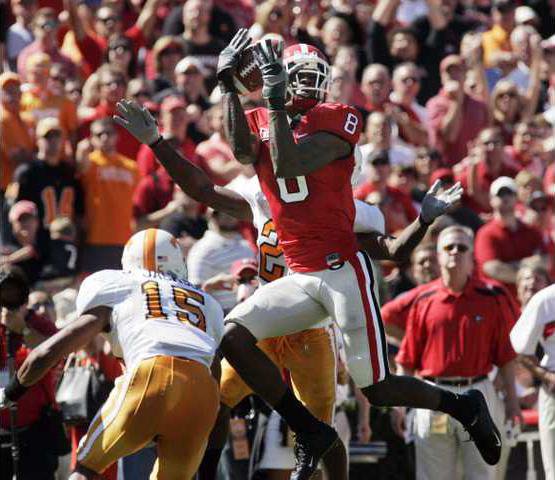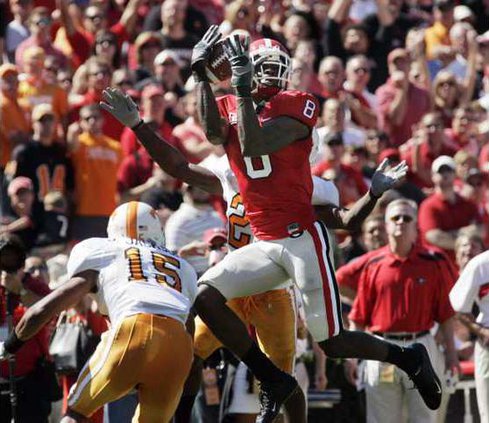A.J. Green’s jersey scandal, North Carolina’s football team suspensions and a recent Sports Illustrated article have rehashed the issue of student-athletes receiving money by way of violating NCAA rules, either through an agent or other means.
When boiling the issue down to its lowest common denominator, there are two sides to choose from: 1) Have schools pay college athletes or 2) Continue to punish them for breaking current NCAA rules.
We’ve all heard the tired argument that college football is a multi-billion dollar industry that floods universities with cash — cash that student-athletes bring into the school — so those universities should in turn share the wealth with its students.
We’ve also heard it’s the evil agents and their shark-like ways, preying on poor, innocent student-athletes with the temptation of money and a better life in the short term.
Nick Saban called for a meeting with Roger Goodell concerning agents, and the Sports Illustrated article — a tell-all from former agent John Luchs — suggested it was the student-athlete approaching the agent for money.
A quick side note: NCAA rules, which prohibit student-athletes from accepting money and gifts from agents, etc., apply to all sports, but student-athletes choosing college football are in a unique situation because college is their only option before the NFL. Baseball players can receive a fat signing bonus for choosing the minors over college. Same for hockey players. Basketball players can choose to take their services overseas and get paid, as Brandon Jennings did until he was eligible to join the NBA.
So football players have to suck it up and play the college game for at least three years before turning pro.
That means football players should be paid to play in college, right?
Wrong.
While it would appear the only way for a college football player to receive funds would be through an agent — i.e. Reggie Bush taking agent money and ultimately crippling USC’s program and having to forfeit his Heisman — allowing the university to pay the athlete wouldn’t solve the problem. If anything, it would make the situation worse.
How do you decide a player’s salary coming out of high school? A college doesn’t know if its getting the next Reggie Bush or the next Reggie Bust.
Or what if there was a flat rate for all college athletes? If you thought Terrell Owens holding out from Eagles camp for more money was bad, imagine if he was in college being paid the same amount as the third-string quarterback.
Also, some universities bring in significantly more money than others and would be better equipped to pay its athletes.
These are just a few examples of the complicated mess that would arise from agreeing to pay a college football player.
So college football players are hopeless in terms of financial aid, right?
Wrong again.
And actually, that’s the simple solution for those who choose to play college football — financial aid. Take out a student loan like so many other college students in America do to get by while receiving an education.
According to the NCAA Division I manual’s bylaws, “Loans, except legitimate loans that are based upon a regular repayment schedule, are available to all students and administered on the same basis for all students.”
So there you have it.
College students are supposed to be broke. They’re supposed to be in the classroom learning, and then take their knowledge to the real world and get paid.
Say the student isn’t an athlete. Say he’s a business major, or an aspiring doctor or lawyer. You don’t see corporations, hospitals and law firms chunking out cash to these potential prospects in hopes of recruiting them. Those students, in most cases, take unpaid internships, or if they do find a job, it’s probably not enough to support a family.
College football players on scholarship don’t have to pay for food, boarding or their education. All they have to do is play football and, if they choose, pay enough attention in class to make their degree substantial when/if they graduate.
And since tuition and books are taken care of, if athletes apply for student loans, they can put all of that money in their bank account and do whatever they want with it.
And the more expensive the institution, the higher the loan amount.
So if I were a college athlete, that’s what I’d do. I’d get the extra cash I’d need to “survive” — you know, the excuse student-athletes give for taking money from agents.
But there’s a much better reason to apply for a student loan instead of taking money from an agent: FAFSA isn’t going to demand three percent of your rookie contract signing bonus. You’re locked in to a low interest rate that no agent would agree to. Plus, the NCAA won’t be riding your back with allegations and no threat of bringing down the program you played for would exist.
It’s called doing things the right way.
Now sure, maybe you wouldn’t get the same, high amount of money an agent could offer, but weren’t you just trying to “survive” anyway?
Of course, there’s also the rule — brought to mainstream light in the Sports Illustrated article — that a student-athlete has no legal obligation to repay an agent. Obviously, the student-athlete would be required to repay a loan, so if he went undrafted he’d be stuck with the tab. But he’d also be stuck with an education.
Bottom line: There is no need for a student-athlete to take money from an agent, and there’s no need for a university to pay its college athletes.
If the student-athlete needs money, take out a loan like the rest of the student population does. And if you’re as good as you think you are, you’ll be able to pay it off with your first paycheck — a debt that would likely take the rest of the student population years to pay off.
Adam Krohn is a sports writer for The Times. Follow him at twitter.com/gtimesakrohn.
Krohn: A simple solution to the student-athlete/agent dilemma


Regional events